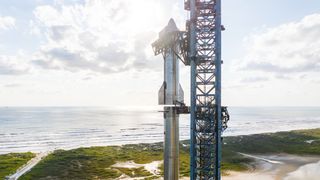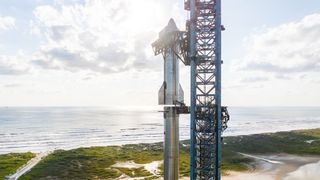2024-10-11T23:05:00.079Z
SpaceX aims for Starship Flight 5 launch on Oct. 13

SpaceX on Friday, Oct. 11, said its next Starship rocket could launch as early as Sunday, Oct. 13, pending final FAA regulatory approvals. Liftoff is targeted for no earlier than 8 a.m. EDT (1200 GMT) on Oct. 13, if the approvals come through in time. A livestream of the launch will be available on this page at launch time.
The upcoming test flight, called Starship Flight 5, will liftoff off from SpaceX’s Starbase testing site near Boca Chica Beach in South Texas – the same site for four previous Starship launch tests. This flight aims to build on SpaceX’s Starship Flight 4 success on June 6, which marked the first Starship to reach space and a smooth “soft” splashdown in the Gulf of Mexico for the rocket’s massive Super Heavy booster.
For Flight 5, SpaceX hopes to recreate the success of the Starship vehicle’s trajectory to target splashdown site in the Indian Ocean. But in a first, SpaceX will also attempt to return the rocket’s massive Super Heavy booster, which is powered by 33 Raptor engines, back to its launch pad. There, SpaceX will attempt to catch the booster in the “chopsticks” of its massive Mechazilla launch pad structure. The system is designed to eventually allow quick turnarounds for Starship Super Heavy boosters for flights.
“Starship stacked ahead of its fifth flight test,” SpaceX wrote in a post on X (formerly Twitter) on Friday afternoon (Oct. 11). “We expect regulatory approval in time to fly on October 13.”
Starship stacked ahead of its fifth flight test. We expect regulatory approval in time to fly on October 13 pic.twitter.com/HCN4dcm1hZOctober 11, 2024
SpaceX and its CEO Elon Musk have said repeatedly that they have been ready to launch Starship Flight 5 since August, but have been held up by FAA reviews and proposed fines related to environmental concerns over the rocket’s water deluge system.
Last month, the FAA said it would likely take until November to issue a license for the Starship Flight 5 launch due to additional reviews related to the water deluge system, which FAA officials have required consultation with other regulatory agencies. Meanwhile, SpaceX is also facing potential fines from the FAA amounting to $633,000 related to Falcon 9 rocket launches. SpaceX has bristled at both the Flight 5 Starship delays and the potential fines, threatening to sue the FAA on the latter issue.
“We find ourselves delayed for unreasonable and exasperating reasons,” SpaceX wrote in a blog post on Sept. 10. “Unfortunately, we continue to be stuck in a reality where it takes longer to do the government paperwork to license a rocket launch than it does to design and build the actual hardware. This should never happen and directly threatens America’s position as the leader in space.”
When fully assembled, SpaceX’s Starship and Super Heavy booster stand about 400 feet (122 m) tall, making it the world’s tallest and most powerful rocket. Both the Starship and its Super Heavy booster are designed to be reusable, though the Flight 5 mission does not plan to recover the Starship vehicle.
NASA has picked SpaceX’s Starship as the lunar lander for its Artemis 3 mission, which aims to send up to four astronauts to the moon for a crewed landing sometime in 2026. SpaceX has also sold at least one flight Starship to American billionaire Jared Isaacman, with reservations for another Starship trip around the moon. One Starship circumlunar flight reserved by Japanese billionaire Yusaku Maezawa was canceled earlier this year.
We will post updates on Starship Flight 5 and subsequent test flights and missions here as events warrant.



